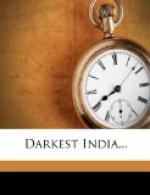Everything appeared to be against him. The people whom he had come to deliver were an undisciplined mob of cowardly slaves, whose spirit had been crushed by years of cruel tyranny. They were unarmed and unaccustomed to war. They were the subjects of the most powerful military monarchy of those times. For them to dream of emigrating must have seemed the wildest folly. On the one hand the Egyptians would not hear of it, and their way would be barred by legions of the best soldiers the world could produce. On the other hand the country to which they were to emigrate was already occupied by numerous and warlike tribes, who would contest every inch of territory. Added to this there was a “great and howling wilderness” which separated the one country from the other.
Hence it will be seen that this vast national emigration scheme was carried out by Moses under circumstances of peculiar difficulty which do not exist in the problem at present under consideration.
There are the same destitute hunger-bitten multitudes, it is true, and the same difficulty arises before us as to what to do with these steadily increasing hordes. The same Egyptian remedy, the construction of vast public works, has been resorted to over and over again, with the effect of giving temporary, but not permanent relief. In some respects the position of the Hebrews in Egypt was preferable to that of the destitute masses in India. They seem at least to have had no lack of food and shelter, and if they had to work hard, and were cruelly treated by their taskmasters, we have become familiar in the Indian villages with many instances of cruelty in the treatment of the low caste by the high such as could not well have been surpassed in Egypt itself, to say nothing of the extortions of the money-lender and the ravages of famine and pestilence referred to elsewhere.
But in many respects the situation is far more hopeful. Our Pharaoh is a Christian Queen, under whom we have, not one, but many Josephs, who are really anxious for the highest welfare of the submerged masses, and who are likely to hail with gladness (as has been already the case in England) any project which bids fair to alleviate permanently the existing misery. The wealth and power of the British Government and Nation, instead of being used to hinder such a scheme, is likely to be thrown bodily into the scale in favour of all reasonable reform that will help congested labour to redistribute itself and recover its normal balances.
Again the progress of science and civilization has removed immense barriers that previously existed, and railways, steamers, post and telegraph have rendered possible for us, if not comparatively easy, what was before only within the reach of miraculous manifestations of Divine Power.
Furthermore, the land is there, plenty of it, for centuries to come, some of it across the seas, within easy reach of our steamers, but a great deal of it quite close at hand. Nor will it be necessary to dispossess others to occupy it. The only enemies that will have to be faced are the wild beasts, always ready to beat a retreat when man appears. It does not even belong to some different nationality or Government, jealous of our encroachments, but is the property of the same Power to whom these destitute multitudes are looking for their daily bread.




